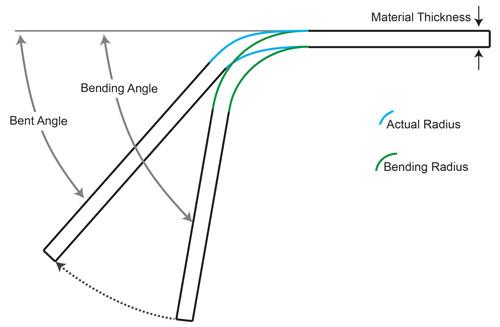Bending is a delicate and demanding process most of the time and common fabricating processes require a degree of formability that make your choice of proper alloy critical.
Bending aluminum sheet grain.
As a general rule the grain line must run perpendicular to the bend to avoid the potential for cracking or fracture.
If having bending lines perpendicular to the grain isn t practical try bending diagonal to the grain.
Bending with the grain may result in cracking or.
There s a rule of thumb to determine a steel s minimum bend radius and this generally works for aluminum too.
Bending with the grain also limits how tight of an inside bend radius you can achieve without cracking the outside of the bend.
Bending the sheet metal longitudinally with the grain allows those grains to separate at the grain boundaries.
Also know that for the best results and fewer cracks on the outside of the bend the bend line should go across or diagonal to the material grain when and where possible.
Bending with the grain gives a different result than bending against it.
This value will vary by grade.
A metal s grain direction is usually only a factor when bending however.
Grain direction bend line should go across the grain for the best bend having said that a typical sharp 90 bend on a piece of 1 8 aluminum sheet should be a minimum 1 8 inside radius use either 3003 or 5052 ideally the bend line should go across the grain.
If the steel has a tensile reduction value of 10 percent divide 50 by that value.
Annealing and normalizing when a strain hardened material is exposed to elevated temperatures the strengthening that results from the plastic deformation of forming can be lost a bad situation if the metal needs that strength to support.
In high purity forms aluminum is soft and ductile.
You must pay careful attention to grain or rolling direction when bending high strength metals especially when trying to achieve a small inside bend radius.
Applying this to metal bending be it plate bending press braking or any other type of metal forming consideration must be given to the grain direction before any process is carried out.
Against the grain if you bend with the grain it will split the grains ask login.
The grain direction is established during the metal rolling process.
Bend angles also can be less consistent.
When bending aluminum know that the smaller your inside bend radius the larger the chance that cracking will occur in the part.
Bending sheet metal can be useful if it s used to build different shapes and different products.
This is because sharper or tighter bends can be made across the grain without cracking.
General advice on aluminum.
When bending high strength materials such as spring or high carbon steel you should orient the part so that it can be bent against the grain.
Depending on designation alloys go through different heat treatment procedures during production.
In addition the grain direction needs to be considered when the bend radius is less than twice the thickness depending on the material and its hardness.




























